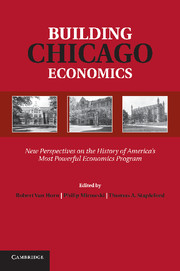 Building Chicago Economics
Building Chicago Economics Book contents
- Frontmatter
- Contents
- Figures and Tables
- Contributors
- Blueprints
- Orientation: In Search of the Chicago School
- Part One Economics Built for Policy: the Legacy of Milton Friedman
- Part Two Constructing the Institutional Foundations of the Chicago School
- Part Three Imperial Chicago
- Part Four Debating “Chicago Neoliberalism”
- Ten Jacob Viner’s Critique of Chicago Neoliberalism
- Eleven The Chicago School, Hayek, and Neoliberalism
- Twelve The Lucky Consistency of Milton Friedman’s Science and Politics, 1933–1963
- Thirteen Chicago Neoliberalism and the Genesis of the Milton Friedman Institute (2006–2009)
- Index
- References
Thirteen - Chicago Neoliberalism and the Genesis of the Milton Friedman Institute (2006–2009)
from Part Four - Debating “Chicago Neoliberalism”
Published online by Cambridge University Press: 05 November 2011
- Frontmatter
- Contents
- Figures and Tables
- Contributors
- Blueprints
- Orientation: In Search of the Chicago School
- Part One Economics Built for Policy: the Legacy of Milton Friedman
- Part Two Constructing the Institutional Foundations of the Chicago School
- Part Three Imperial Chicago
- Part Four Debating “Chicago Neoliberalism”
- Ten Jacob Viner’s Critique of Chicago Neoliberalism
- Eleven The Chicago School, Hayek, and Neoliberalism
- Twelve The Lucky Consistency of Milton Friedman’s Science and Politics, 1933–1963
- Thirteen Chicago Neoliberalism and the Genesis of the Milton Friedman Institute (2006–2009)
- Index
- References
Summary
Introduction
The year is 2011. With the Great Recession approaching its fourth birthday, and economists still struggling to make sense of what markets have wrought, it is no surprise that the reputations of some celebrated economists have taken a hit. In some cases, the reappraisal was dramatic and probably decisive. (Will it ever again be possible to call Alan Greenspan the “Maestro” with a straight face?) In other cases, the crisis has served less to settle matters than to inflame ongoing disputes. So it is with Milton Friedman.
Friedman is probably best known outside of academic economics for his championing of promarket views (and his aggressive attacks on opposing views) in his widely read books like Capitalism and Freedom, his PBS series Free to Choose, and his recurring Newsweek column. In 2008 (in what now looks like a case of catastrophically bad timing) the administration of the University of Chicago decided it would be an opportune time to “honor Friedman’s legacy” and announced it planned to establish a privately funded $200 million research institute. It did not take long for University of Chicago professors numbering more than one hundred in total from fields as disparate as anthropology, political science, and statistics to express their displeasure. Presently, the dispute broke out of the confines of the university and spilled onto the pages of the New York Times and the Wall Street Journal.
- Type
- Chapter
- Information
- Building Chicago EconomicsNew Perspectives on the History of America's Most Powerful Economics Program, pp. 368 - 388Publisher: Cambridge University PressPrint publication year: 2011
References
- 6
- Cited by
